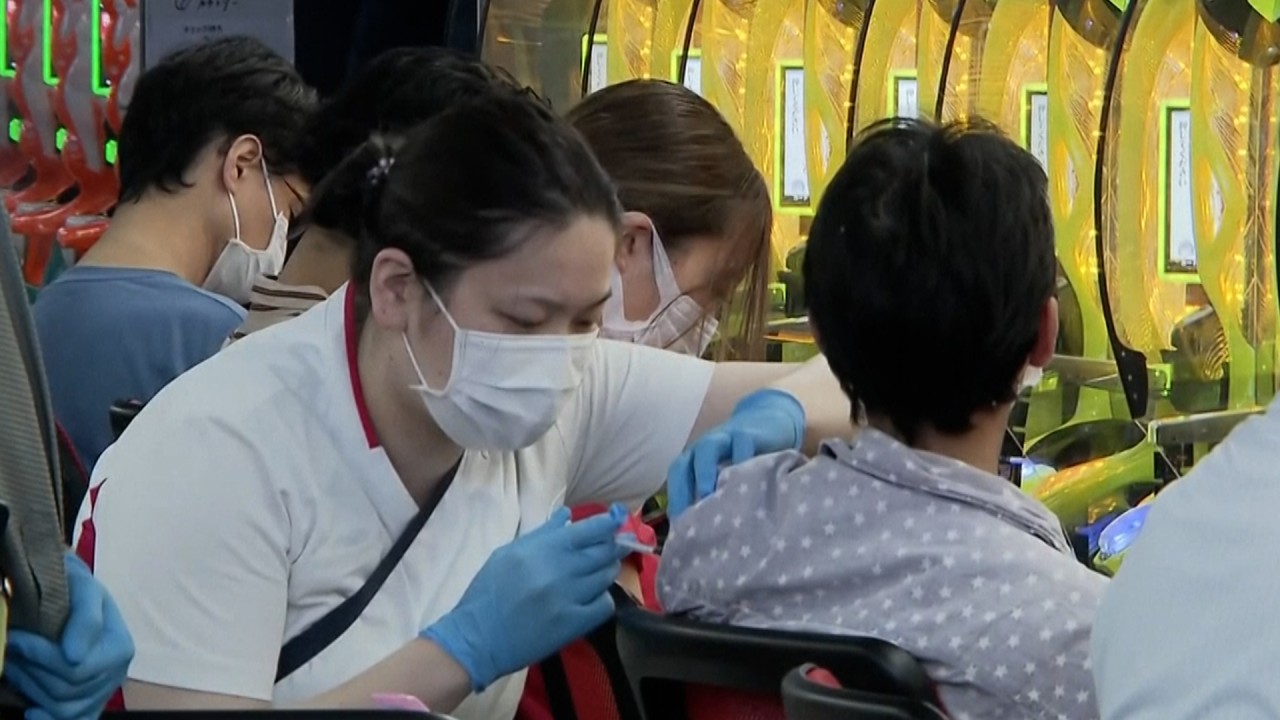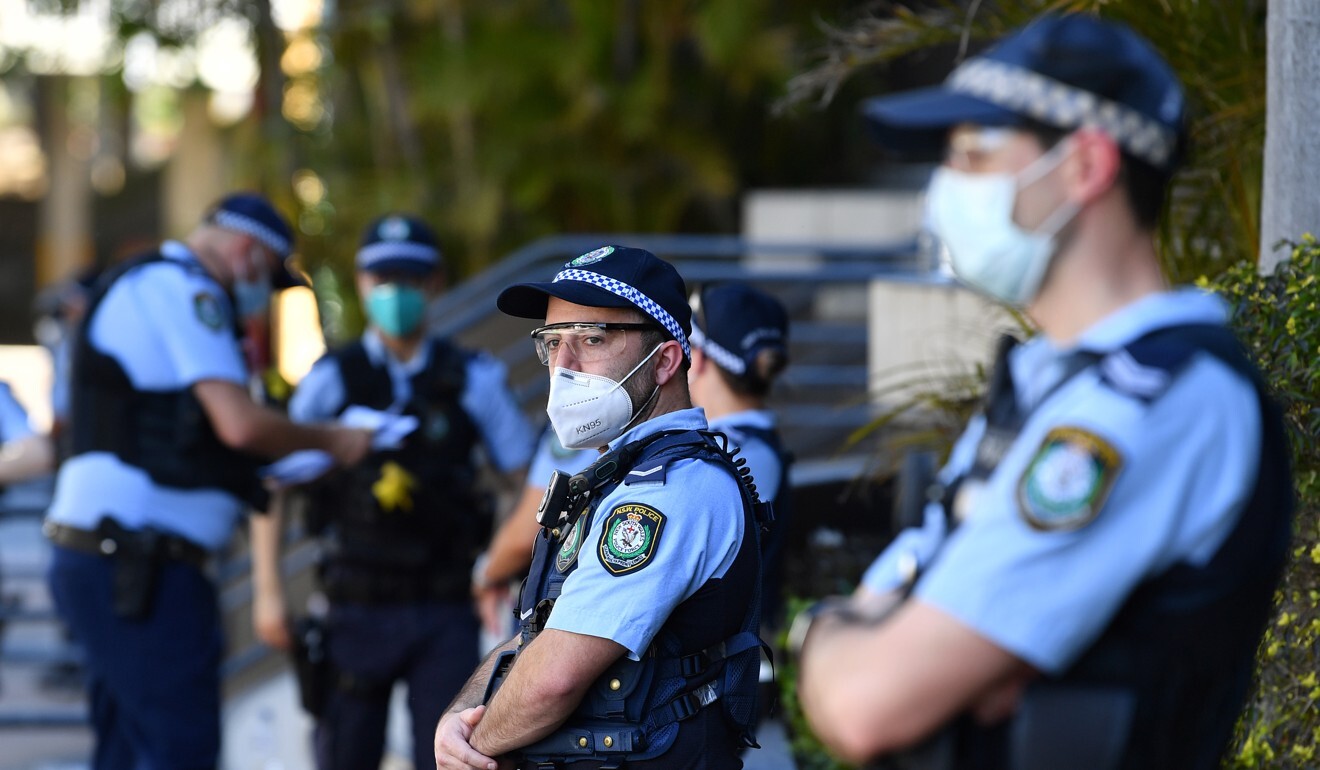
Coronavirus: Japan overtakes US on first vaccinations; Australia trials face recognition tech to enforce quarantine
- Japan’s progress means that the US now ranks last among G7 nations by proportion of population who have received at least one vaccine dose
- Elsewhere, Langkawi became the first Malaysian island to reopen to tourists on Thursday, and Indonesia is easing visa rules for vaccinated foreigners
Japan has administered a total of 145.8 million shots, and over 51 per cent of its population is fully vaccinated, according to government figures released on Tuesday.

00:58
‘Shots while chasing jackpots’: pachinko parlour becomes vaccine centre in Japanese city of Osaka
The vaccination roll-out in Japan started off slow and late compared to other developed nations, but has progressed quickly since early summer. Japan hit a million shots administered per day in mid-June, and has stuck around that pace since then while battling a wave of infections driven by the predominance of the Delta variant. The US, meanwhile, got a head start but has not been able to maintain pace.
Japan’s vaccinated population is concentrated among its elderly, who were initially prioritised. Near 90 per cent of those 65 or older have had both jabs. The country is still rushing to inoculate younger people, who have been most affected in the most recent and worst-yet wave of infections.
Opinion | What if a Covid-19 vaccination could give you a better, happier life?
As shots in Japan are still being delivered at a brisk pace, it is too early to tell how much hesitancy may affect the vaccination programme in the country, which has a testy history with vaccines.
Japanese officials are seeking to vaccinate all those who are eligible and willing by November, with the goal of having at least 80 per cent of the population vaccinated.
Australian police trial face recognition tech to enforce quarantine
Little-known tech firm Genvis Pty Ltd said on a website for its software that New South Wales and Victoria, home to Sydney, Melbourne and more than half of Australia’s population, were trialling its facial recognition products. Genvis said the trials were being conducted on a voluntary basis.
The Perth, Western Australia-based start-up developed the software in 2020 with police to help enforce pandemic movement restrictions, and has said it hopes to sell its services abroad.
South Australia state began trialling a similar, non-Genvis technology last month, sparking warnings from privacy advocates around the world about potential surveillance overreach.

Under the system being trialled, people respond to random check-in requests by taking a selfie at their designated home quarantine address. If the software, which also collects location data, does not verify the image against a “facial signature”, police may follow up with a visit to the location to confirm the person’s whereabouts.
Though the technology has been used in Western Australia since last November, it has more recently been pitched as a tool to enable the country to reopen its borders, ending a system in place since the start of the pandemic that requires international arrivals to spend two weeks in hotel quarantine under police guard.
Meanwhile, Australia’s Victoria state reported its biggest one-day rise in Covid-19 cases of the year on Thursday with 514 new infections – exceeding the year’s previous daily high of 473 on Monday.
Australia’s coronavirus infection rates are far lower than those in many other countries, with some 80,000 cases and 1,128 deaths, and authorities are promising to relax many tough curbs, perhaps next month, after more people get both of their vaccine shots.
Australia warns against ivermectin as imports of drug surge tenfold
“That 70 per cent double dose and 80 per cent double dose mark is within plain sight. Keep going Australia,” Prime Minister Scott Morrison said during a media briefing in Canberra.
Under a reopening plan unveiled in July, the federal government will urge states and territories to start living with the virus once those high targets are reached.
To date, 44 per cent of people over the age of 16 in the country are fully vaccinated while 69 per cent have had at least one dose.
Malaysian holiday island opens as tourism restarts
Visitors flocked to the Malaysian island of Langkawi on Thursday as it became the country’s first holiday hotspot to reopen after a coronavirus lockdown that has hammered the vital tourism industry.
But with the outbreak gradually easing, Langkawi, one of tropical Malaysia’s premier holiday destinations, has been chosen for a pilot project to reopen the sector to domestic tourists.
The island began welcoming visitors on Thursday, with water cannons firing over the first plane to land at its airport.

“We’re very excited because we haven’t been anywhere since February 2020,” said Andrea Manason, an Australian woman based in Kuala Lumpur travelling with her family of six. “It’s real exciting for us to be here, and to actually have the kids leave the house.”
Under the initiative, hotels and businesses have been allowed to reopen while activities on the island’s palm-fringed beaches are resuming. Tourists must be fully vaccinated to visit and have to take a virus test before departure.
Alexander Issac, head of a yacht charter firm, said he was delighted at the reopening as the island’s tourism sector had been “badly impacted” by virus curbs. “We can’t afford any more lockdowns … We need to reopen the economy and get people working again.”
The island off Malaysia’s northwest coast has long been popular with domestic and overseas visitors, although for now foreign tourists are still barred from entering the country. It welcomed around 3.9 million visitors in 2019, with the number falling dramatically since the pandemic began. If the island’s “tourism bubble” is a success, then other holiday destinations are expected to reopen soon.

Malaysia imposed a nationwide lockdown in June as the highly contagious Delta variant sparked a surge in infections, and has now logged more than two million cases and over 22,000 deaths.
But authorities have started easing curbs in recent weeks as the outbreak slows and the vaccine roll-out picks up speed, with over half the population now fully inoculated.
Indonesia eases visa rules for vaccinated foreigners
Non-Indonesians with visitor visas, which can also be for family, journalistic or transit reasons, can enter the country, said Wiku Adisasmito, spokesman for the government’s Covid-19 task force. Those holding the Asia-Pacific Economic Cooperation business travel cards, permits to stay for diplomatic and work purposes, or permanent or limited rights to stay, can also enter, according to a statement on the immigration office’s website.
Southeast Asia’s largest economy has been shut to most foreign travellers since April last year amid the pandemic, only allowing certain visitors to enter for business essential purposes. The country had considered reopening its borders multiple times as the travel ban battered its tourism industry, while the threat of new coronavirus variants kept its borders closed.

Indonesia will require proof of full vaccination in visa applications, as well as a statement to ensure that the visitor will comply with all health protocols and has health insurance, or is willing to independently pay for medical costs if they were to contract Covid-19.
International entry is only allowed through two airports in Jakarta and Manado as well as three seaports in Batam, Riau and North Kalimantan in a bid to prevent the arrival of any new variants, according to a separate Transport Ministry statement. Entry by land is limited to arrivals through Entikong and Aruk in West Kalimantan.
Reporting by Reuters, Bloomberg, Agence France-Presse
